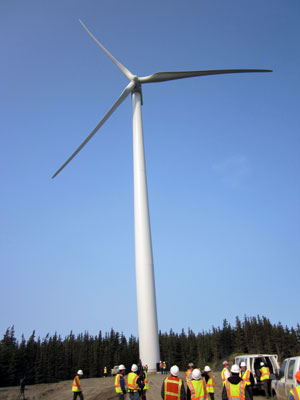After years of talks and setbacks, there’s momentum to expand the Fire Island Wind project. The first turbines started spinning on the island near Anchorage four years ago, but a planned expansion has been stalled ever since.

Cook Inlet Region, Incorporated, or CIRI, wants to double the number of wind turbines on Fire Island from 11 to 22. But convincing power companies to pay for its electricity has been hard.
CIRI this week announced it’s nearing a deal with Golden Valley Electric in Fairbanks.
Golden Valley Electric President and CEO Cory Borgeson thinks they can get the power for as low as $56 per megawatt hour — about 40 percent lower than the utility’s average cost of power now.
“It’s not cheap, but we think the benefits of the wind and the reasonable cost that CIRI is providing us [means] it makes economic sense to take a real good hard look at this,” said Borgeson.
Ethan Schutt of CIRI said the talks may be good sign for independent renewable energy producers in Alaska, but he added they’re still fighting an uphill battle. For example, Alaska doesn’t have state-mandated renewable energy targets that power companies have to meet.
“Basically all we have to offer to attract the utilities is the stability of the price and the ultimate price of the delivered power. There’s no other leverage in our system here,” said Schutt.
There’s also the matter of sending power all the way to Fairbanks. Because it moves through other power companies’ territory, it costs more. That’s another sticky issue they’re trying to resolve.
Elizabeth Harball is a reporter with Alaska's Energy Desk, covering Alaska’s oil and gas industry and environmental policy. She is a contributor to the Energy Desk’s Midnight Oil podcast series. Before moving to Alaska in 2016, Harball worked at E&E News in Washington, D.C., where she covered federal and state climate change policy. Originally from Kalispell, Montana, Harball is a graduate of Columbia University Graduate School of Journalism.




